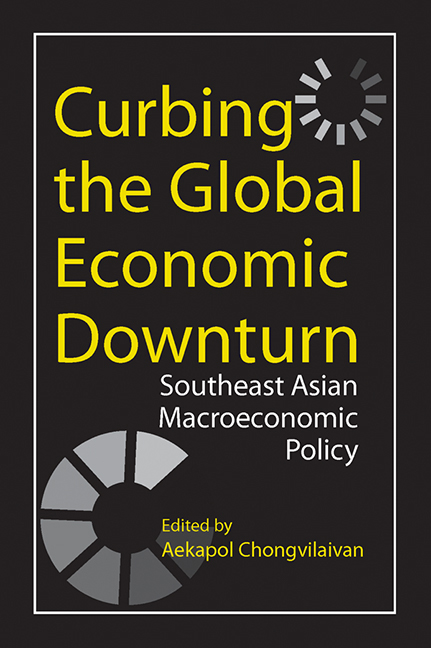Book contents
- Frontmatter
- Contents
- Acknowledgements
- Introduction
- List of Contributors
- PART I Economic Fluctuations: Macroeconomic Effects and Policy Responses
- 1 Macroeconomic Impacts of a Financial Crisis
- 2 Capital Inflow Reversals, Current Account Adjustments, and Macroeconomic Performance
- 3 Supply-Side Causes of Macroeconomic Fluctuations in a Small Open Economy
- 4 Effectiveness of Fiscal Stimuli
- 5 Public Debt Sustainability and Its Macroeconomic Impacts
- PART II Economic Co-operation in Southeast Asia
- Index
4 - Effectiveness of Fiscal Stimuli
from PART I - Economic Fluctuations: Macroeconomic Effects and Policy Responses
Published online by Cambridge University Press: 21 October 2015
- Frontmatter
- Contents
- Acknowledgements
- Introduction
- List of Contributors
- PART I Economic Fluctuations: Macroeconomic Effects and Policy Responses
- 1 Macroeconomic Impacts of a Financial Crisis
- 2 Capital Inflow Reversals, Current Account Adjustments, and Macroeconomic Performance
- 3 Supply-Side Causes of Macroeconomic Fluctuations in a Small Open Economy
- 4 Effectiveness of Fiscal Stimuli
- 5 Public Debt Sustainability and Its Macroeconomic Impacts
- PART II Economic Co-operation in Southeast Asia
- Index
Summary
The Asian financial crisis of 1997 led to output declines in South Korea, Taiwan, and Thailand. In response, the three countries have turned to fiscal policy to stimulate output. This study investigates the empirical evidence on the viabiltiy of fiscal policy for these three Asian countries using data starting in the 1950s. While fiscal expansion can raise output under certain theoretical conditions, deficit spending implies higher taxes that could eliminate even transitory effects. This article explores these issues, and examines the empirical relationships between government spending, taxes, and output in these three Asian “tigers”.
The literature includes varying views on the links between fiscal policy, government spending, and output. The tax-and-spend hypothesis of Buchanan and Wagner (1978) and Friedman (1978) is that taxes lead to government spending. On the other hand, according to the spend-and-tax hypothesis of Peacock and Wiseman (1979), temporary increases in government spending lead to permanent tax increases. Meltzer and Richard (1981), describe fiscal synchronization and state that spending and taxes would adjust as the public chooses an optimal package of taxes and government spending. The related literature using Granger (1988) causality includes von Furstenberg, Green, and Jeong (1986), Owoye (1995), Hasan and Lincoln (1997), and Darrat (1998). In addition, Koren and Stiassny (1998) consider whether taxes and spending are cointegrated.
The dynamic responses of taxes, spending, and income are examined in this article using vector autoregression (VAR) analysis. Impulse response and variance decomposition are also included as in Baffes and Shah (1994) and Koren and Stiassny (1998), because coefficients of a VAR are difficult to gauge. Impulse responses trace the reaction of an endogenous variable to an innovation, capturing dynamic interactions and adjustment speeds. Variance decomposition measures the share of forecast error variance due to a shock to the system and own innovations would explain the forecast error variance of exogenous variables.
- Type
- Chapter
- Information
- Curbing the Global Economic DownturnSoutheast Asian Macroeconomic Policy, pp. 67 - 76Publisher: ISEAS–Yusof Ishak InstitutePrint publication year: 2010



